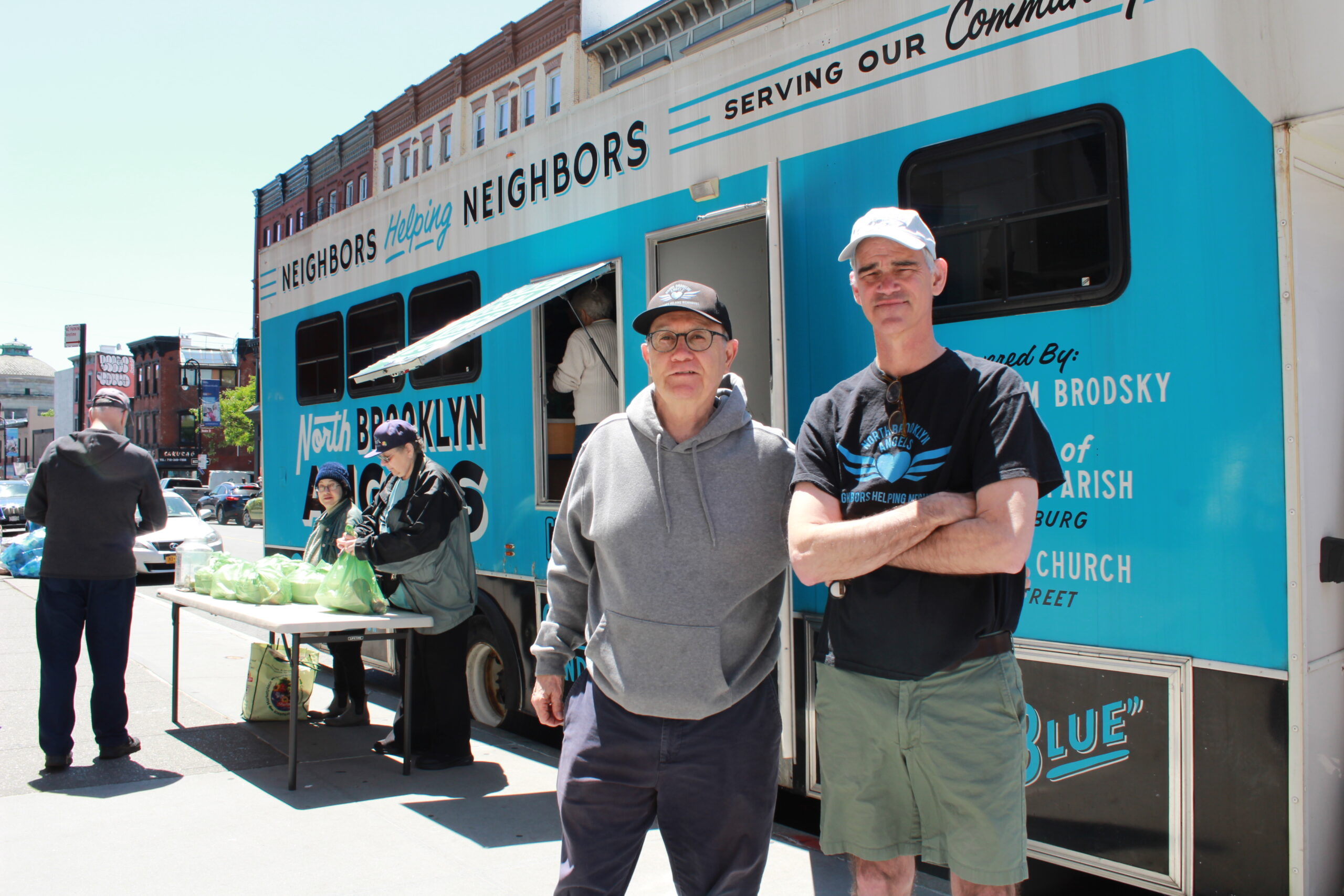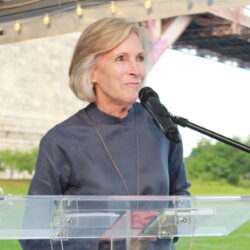
✰PREMIUM
Reverend John Merz is helping lead a gang with ‘prosocial values’
The North Brooklyn Angels, cofounded by Merz, turns eight this June

Author’s Note: Rev. John Merz is a staple of North Brooklyn. Anyone who doesn’t know him probably knows the white and blue “angelmobiles” that buzz around the neighborhood passing out food to anyone who wants it. Merz cofounded the North Brooklyn Angels with Neil Sheehan, and as the organization turns eight on June 19, it can confidently say it is embodying the mission to “help neighbors help neighbors.”
NORTH BROOKLYN — It’s hard to miss the blue and white North Brooklyn Angels delivery truck outside the Church of the Ascension when walking down Kent Street in Greenpoint.
Rev. John Merz, a co-founder of the organization, says their logo is reminiscent of a biker gang. “A gang with prosocial values,” he jokes.
At eight years old in June, the North Brooklyn Angels is one of the largest mutual aid organizations in the borough. It serves 2,000 meals per week on average, but hit a peak during the pandemic when it served 3,000 meals weekly.
As co-founder Neil Sheehan notes, “the food is not the business, the business is neighbors helping neighbors.”
Jimmy Cajoles is among the hundreds of neighbors who have kept the North Brooklyn Angels operating. Cajoles, who is a member of the Church of the Ascension in Greenpoint where Merz delivers his sermon every Sunday, got involved during the pandemic.
“[Merz] and I have always had a long on-going conversation of what it means to live a practically moral life and how confusing that can be in terms of participating in a capitalist structure,” Cajoles said. “He said, ‘Well, here is a practical obvious good: If someone is hungry, you will hand them food. If somebody is thirsty, you will hand them water. That’s an uncomplicated, good and necessary one.’”

Merz also asked Cajoles if he could drive a van, and before Cajoles knew it, he was doing food delivery runs to Woodhull Hospital in the height of the pandemic. The North Brooklyn Angels’ fleet of vans now serves hot meals every day at locations across Brooklyn.
Merz told the Brooklyn Eagle he has always been interested in questions about what it means to lead a moral life in a city fraught with inequality. He remembers going to Catholic school with kids much poorer than him and his family and hearing stories from his father who grew up low-income in Flatbush.
“I became sensitized to the extreme differences of people who walk on the same sidewalk,” Merz said.
That sentiment drew him to the Occupy Wall Street movement in 2011, where he would be arrested for trespassing. “I’m willing to occupy space in an act of civil disobedience in order to shine a light on social and economic injustice,” Merz told the New York Times at the time.
“I was also there not as an activist but as a priest, somebody who’s listening, and the [activists] like to see somebody with a collar standing around to say, ‘This isn’t so freaky and abnormal,’” Merz said. He added that the Episcopalian Church, Catholic Church and the new Pope Leo XIV have a long history of advocating for the poor.
Faith roots
Merz wasn’t always as religious as he is today. After being raised in the Catholic Church, he left it behind in eighth grade.
“I had it with the rules and the intensity and all that stuff. I just didn’t like it,” Merz said, adding, “Actually, looking back, I liked some of the nuns.”
After high school, Merz worked as a carpenter while taking night courses at Brooklyn College. Months after graduating from Brooklyn College in 1994, Merz continued to meet with one of his religious studies professors, who would trade religious books with him.
Merz said the professor eventually told him “something deeper is going on here. You’ve graduated and we’re still meeting and I’m giving you syllabi to study, and I think you should go to church and see what happens.”
Merz landed at an Episcopalian church in Manhattan. The dogma and answers he resented from Catholicism were replaced by deep questions. Those questions drove him to attend seminary at Yale in 2000. Four years later, he was ordained as a minister in the Episcpolian Diocese of New York.

In 2010, he received an offer from Rt. Rev. Lawrence Provenzano, the eighth Bishop of the Episcopal Diocese of Long Island, to lead the Church of the Ascension in Greenpoint.
“He wanted the church to look outward to the community, not inward on itself,” Merz recalled Provenzano telling him that “if we can not do that in three years, we will likely have to close the church.”
Merz moved in with his wife and began building, literally and figuratively. Merz reminisced on the decrepit structure he inherited.
“This building was essentially a barn … it had no bathrooms, the worship space was old and dark,” Merz said. Merz had the church renovated, which happens to be the oldest building in Greenpoint. The new basement has a kitchen where volunteers cook meals for the North Brooklyn Angels’ Sunday breakfasts. Merz replaced the pews with chairs. “Everything here is on wheels and can be moved,” he remarked.
Changes to the church weren’t “without its conflict. People don’t like change, but we just pressed on and pushed through and things changed,” Merz said.
Around 15 years later, the average age of parishioners is 28-34, 25 years younger than the average age of Episcopal churchgoers, according to Merz. On Sundays, the church attracts a steady average of 60 parishioners from all walks of life.
A smaller crowd gathered for service on Memorial Day weekend. Following a few hymns and songs, Merz jumped into his sermon, where he said Jesus asked a man “did he want to be well —” so, what does it mean to be well?
Cajoles, who was raised in the Southern Baptist Church, said he grew up hearing “this is exactly the way it is.” Merz’s approach, feeding his parishioners questions to chew on, keeps Cajoles coming back.
“He is fine with not answering questions,” Cajoles said. Nonetheless, the two debate frequently, “because we disagree a lot and he’s always happy to talk about that and he doesn’t ever seem bothered by me.”
Claire Lorentzen-Goler, who has been attending Merz’s church for three years with her wife Kellyn, also appreciates that Merz doesn’t always frame his questions or sermons around faith.
“What does it mean to be well, that’s a really universal question … and we can all answer that in our own ways. For some people, that may have to do with faith, for other people it may have nothing to do with that,” Lorentzen-Goler said.
Food for the hungry, water for the thirsty
When New York City was hit by Hurricane Sandy, Merz and a couple of his colleagues went down to Midland Beach in Staten Island to help with the relief effort. He remembered “the area was totally destroyed.”
Merz got to work with the priest of St. Margaret Mary Catholic Church and the local community, turning the local Catholic school into a relief hub. Some of the activists who had learned organizing skills during the Occupy Wall Street movement also joined in, according to Merz.

“We formed a tool lending library in the classrooms, the firemen and the police took over the gym, then Make The Road came down and occupied part of the building to help the immigrant community. It was just an amazing moment.” Merz said. It was so amazing that the Department of Homeland Security would go on to study their relief efforts.
“They couldn’t understand how community organizations were outperforming the Red Cross and all these other organizations,” Merz explained. “It’s like this: people in these communities, they know their communities. They don’t land in the community, they are the community.”
The North Brooklyn Angels is proof that Merz takes that approach to heart.
“Right from the beginning we were not thinking about food,” Merz said. “We were thinking about ways of remediating the effects of gentrification and how we could bring affluent residents into physical contact with older residents and poorer residents.”
Justine Lee started volunteering with the Angels a year and a half ago. Lee said she has “met people who I probably wouldn’t have otherwise.”
“I’ve only been here for a very small amount of time compared to the other volunteers, so it’s really cool to learn about the history [of the neighborhood],” Lee said. “It’s an hour of my time basically hanging out but also helping people.”
Leave a Comment
Leave a Comment





